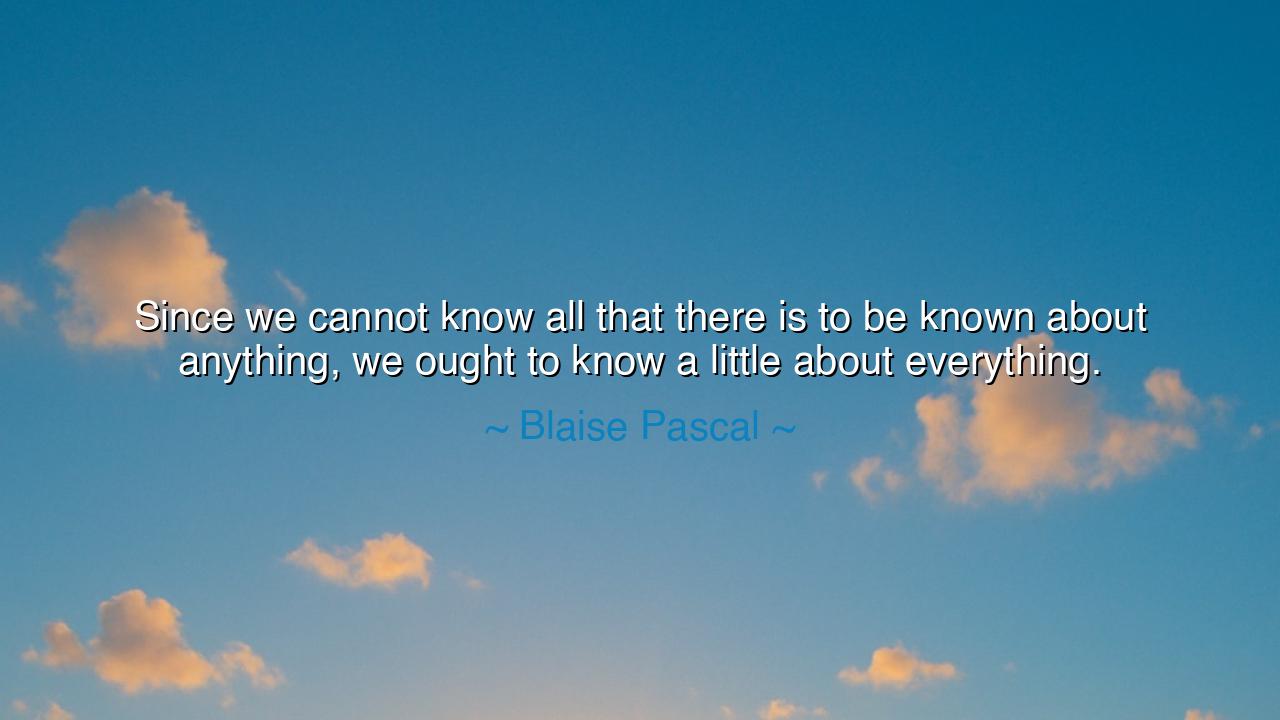
Since we cannot know all that there is to be known about
Since we cannot know all that there is to be known about anything, we ought to know a little about everything.






There are truths that carry the calm light of eternity, and among them stands the wisdom of Blaise Pascal, who once wrote: “Since we cannot know all that there is to be known about anything, we ought to know a little about everything.” These words are not a mere reflection on learning, but a profound meditation on the limits of human understanding and the boundless beauty of curiosity. Pascal, the mathematician, philosopher, and theologian of the seventeenth century, knew more than most about the vastness of knowledge—and the finitude of man. His words remind us that while the universe stretches beyond our grasp, the soul of the wise does not despair at this limitation; it reaches outward, gathering small fragments of truth wherever it may find them.
To “know a little about everything” is not to scatter the mind aimlessly, but to live in harmony with the vastness of creation. Pascal teaches that humility in knowledge is the beginning of true wisdom. No matter how deeply one studies, no matter how much one masters, there will always remain more unseen than seen, more unknown than known. The scholar who believes he can master all things becomes blind to wonder; but the one who admits the limits of his knowledge remains forever open, forever growing. In this openness lies the spark of enlightenment, for the mind that touches many things learns to weave them together, seeing unity where others see division.
The origin of this insight lies in Pascal’s own life—a life both brilliant and brief. A prodigy of mathematics, he invented the first mechanical calculator before he was twenty. Yet he also wrote with the heart of a philosopher and the soul of a theologian. He explored geometry, physics, and the human condition with equal reverence. In his Pensées, he pondered the mystery of man’s greatness and misery, his reason and his weakness. It was from this lifelong meditation that his wisdom flowed: since no field of study can reveal the whole of truth, one must look across them all, and gather what light each can give. Pascal’s genius was not in knowing everything—it was in knowing that every piece of knowledge holds a portion of the divine.
History gives us shining examples of those who lived this truth. Consider Leonardo da Vinci, the immortal embodiment of Pascal’s ideal. Painter, engineer, anatomist, inventor—Leonardo’s curiosity had no boundary. He studied the flight of birds to design flying machines, the motion of water to understand both art and nature, the structure of the body to paint the soul. He did not confine himself to one discipline because he saw that knowledge is a single tree with many branches, and to touch one branch alone is to miss the beauty of the whole. Leonardo’s greatness was not that he knew everything, but that he sought to know a little about everything—and from those fragments of insight, he created harmony between art and science, between imagination and truth.
Pascal’s wisdom also speaks to the age in which we live. Ours is a time when the pursuit of knowledge has become narrow, divided, and specialized. We produce experts in fragments—men who know everything about one small thing and nothing beyond it. But the world is not built of fragments; it is a tapestry of interwoven truths. To live wisely, we must recover the art of breadth of mind, the ability to see connections where others see walls. The physician who studies poetry understands healing better. The engineer who studies history builds more humanly. The leader who studies philosophy governs with compassion. To know a little of everything is to keep one’s sight wide and one’s heart alive.
There is a moral depth, too, in Pascal’s teaching. For the one who learns widely also learns humility. When we touch the edges of many worlds, we begin to feel how vast creation truly is, and how small we are within it. Yet this smallness is not despair—it is reverence. To know a little of everything is to stand in awe before the endless mystery of life, to feel wonder instead of pride, curiosity instead of arrogance. Such a mind is not swollen by knowledge but nourished by it; it knows that every field of study, every art, every truth, is a doorway to understanding the divine order of the world.
The lesson, then, is this: be broad in learning, and humble in knowing. Do not fear the limits of knowledge—embrace them. Learn from every discipline, listen to every voice, observe every corner of life. Read widely, travel far in thought, and let your curiosity roam freely. A mind that explores many paths grows not confused, but complete. It learns that all things are connected—the stars above and the heart within, the poem and the equation, the soul and the science.
So, let Blaise Pascal’s wisdom be a guiding flame for all who seek truth: “Since we cannot know all that there is to be known about anything, we ought to know a little about everything.” The infinite may lie forever beyond our reach, yet through curiosity, we can taste a thousand fragments of its beauty. In each small thing learned, in each idea understood, the universe whispers a little more of its secret. And thus, though man can never know all, he can live as one who forever learns—a student of all existence, and a lover of all wisdom.






AAdministratorAdministrator
Welcome, honored guests. Please leave a comment, we will respond soon